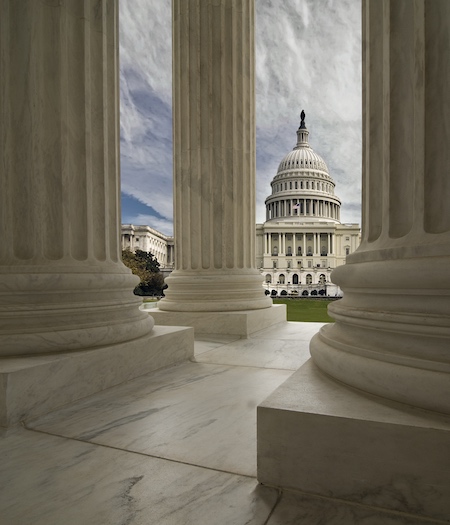As a New Chertoff Letter Raises More Questions About the Leak Investigation, FTC Pushes Congress to Invite the Justices to Fill in the Gaps
A lackluster investigation, a laughable “review” and a Court-proposed double-figure increase in discretionary spending all point to a need for public accounting
 Given all that the public still does not know about what both the left and right have deemed to be an ineffective investigation into the leak of the Dobbs draft, not to mention new details emerging today about the still strange stamp of approval said investigation received from a firm with whom SCOTUS had an existing seven-figure security contract (don’t bite the hand that feeds you!), Fix the Court is calling on lawmakers to invite the justices to Capitol Hill to answer questions on those topics and to justify why in a time of tightening budgets they deserve the 16 percent increase in discretionary spending ($109.6 million to $127.1 million) they’ve requested for the next fiscal year.
Given all that the public still does not know about what both the left and right have deemed to be an ineffective investigation into the leak of the Dobbs draft, not to mention new details emerging today about the still strange stamp of approval said investigation received from a firm with whom SCOTUS had an existing seven-figure security contract (don’t bite the hand that feeds you!), Fix the Court is calling on lawmakers to invite the justices to Capitol Hill to answer questions on those topics and to justify why in a time of tightening budgets they deserve the 16 percent increase in discretionary spending ($109.6 million to $127.1 million) they’ve requested for the next fiscal year.
Only once in the last eight years, in 2019, have justices been called by Congress to testify.
“So many questions remain about the poorly designed investigation that took place post-leak, that the public deserves great accounting,” FTC’s Gabe Roth said. “Let’s take advantage of this one Court-related topic where the left and right agree and have a true public accounting about how the investigation went wrong and how we can ensure that if a leak happens again, there won’t be so many missteps.”
Seeing as how the Court is not required to follow the same open records laws or federal contracting regulations that bind the other two branches, it’s not surprising that it’s taken investigative journalism to uncover greater detail about the Chertoff Group’s contract with the justices.
What was surprising was Chertoff writing in January that he could not “identify any additional useful investigative measures” related to the Court’s internal investigation of the leak. Here’s a few: Make the justices sign the same sworn affidavits other employees signed that they didn’t leak the Dobbs draft. Review the justices’ Internet and phone history. Hire any one of the many federal law enforcement agencies blocks from the Court that has investigative experience to conduct the investigation.
Fix the Court, via FOIA, has asked the FBI whether its top officials were in contact with the Supreme Court in the months following the leak.
Contrary to the Marshal’s Office, which comprises individuals who could be fired by those they were investigating, and despite the recent politicization of the FBI, that agency employs hundreds of individuals with investigative experience that could have been leveraged post-leak.
Today’s news comes as a result of a letter written to Chertoff by Sen. Sheldon Whitehouse and Rep. Hank Johnson, who this afternoon released Chertoff’s response. FTC appreciates the lawmakers, as well as CNN, which first broke the news of the Chertoff contract, for staying on this story.
Back to the budget:
As part of the Court’s proposed 16 percent increase in discretionary spending, the justices requested an additional $10 million (nos. 12 and 13, p. 18) for security funding, which may be necessary, given increased threats, but taxpayers also deserve to know where all of the Court’s public money is being spent, and that scant information on such accounting has been released is typical SCOTUS opacity.
In fact, the request does not say how much taxpayer money the Court is currently spending on its security and how many security personnel it currently employs. It was reported a few years back that there are roughly 190 positions in the Supreme Court Police Department, and it’s not known what percentage of the roughly $750 million (p. 528) the U.S. Marshals Service receives to protect judicial officers goes toward protecting the justices.
Justices could answer those questions and speak to a new program lawmakers authorized last year, where the Court may now enroll SCPD deputies in the same student loan reimbursement program that’s available to Capitol Police. Sources had told FTC that that omission had been cited as a detriment for SCPD recruiting over the years.
FTC reached this week to multiple House and Senate Appropriations staff to request public hearings with the justices but has not heard back from them.